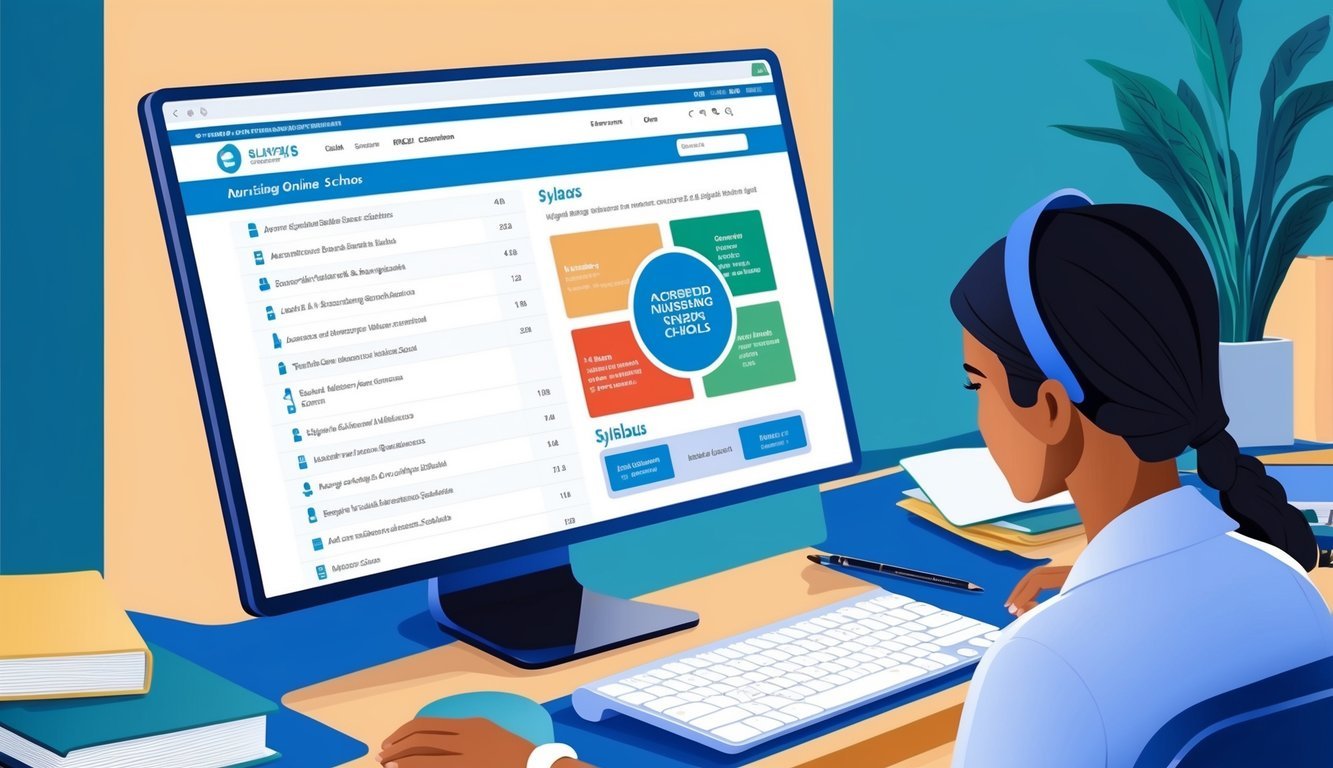As you consider advancing your career in nursing, understanding the landscape of online programs is crucial.
Accredited online nursing schools offer a flexible and accessible path to earning your degree.
This enables you to balance your education with your personal and professional commitments.
This option is particularly appealing for those who may not be able to attend traditional classroom settings due to time constraints or geographical limitations.
Choosing an accredited program ensures that you receive a quality education that meets industry standards, which is essential for your future licensure and career success.
With various degree options available, such as RN-BSN or MSN, you can tailor your educational journey to meet your goals.
Exploring Accredited Online Nursing Programs can provide you with valuable insights into the degree options that align with your aspirations.
As the demand for qualified nurses continues to grow, now is a great time to explore how online education can facilitate your entry or advancement in this vital field.
With proper research, you can find a program that supports your career ambitions while offering the flexibility you need.
Accreditation and Standards in Online Nursing Education
Accreditation is a critical aspect of online nursing education, ensuring that programs meet established quality standards.
Understanding the types of accreditation and their significance helps you make informed decisions when choosing a nursing school.
Understanding Accreditation for Online Nursing Schools
Accreditation for online nursing programs signifies that a school meets rigorous standards set by recognized agencies.
These standards cover various aspects, including the curriculum, faculty qualifications, and student services.
Programs accredited by respected bodies ensure that you receive quality education and are well-prepared for licensure exams.
In the U.S., two primary types of accreditation exist: institutional and programmatic.
Institutional accreditation evaluates the entire school, while programmatic accreditation focuses specifically on nursing programs.
When researching online nursing schools, ensure that they are accredited by a reputable organization.
Commission on Collegiate Nursing Education (CCNE)
The Commission on Collegiate Nursing Education (CCNE) is a prominent accrediting agency for nursing programs in the United States.
It evaluates baccalaureate and graduate nursing programs against established standards.
CCNE accreditation signifies that a nursing program adheres to high-quality educational practices.
Programs accredited by CCNE typically offer robust curricula that prepare graduates for the complexities of modern healthcare.
In addition, CCNE promotes ongoing improvement through its accreditation process.
This ensures that programs continually evolve to meet the changing demands of nursing education.
For details on CCNE-accredited programs, visit their official website.
Accreditation Process and Importance
The accreditation process involves comprehensive evaluations, including self-studies and site visits.
Schools must demonstrate compliance with standards related to governance, curriculum, faculty, and student learning.
This rigorous process often takes several months to complete.
Accreditation is essential not only for educational quality but also for your future employment opportunities.
Employers often require candidates to have graduated from accredited programs.
Furthermore, attending an accredited school facilitates eligibility for federal financial aid and grants.
To remain accredited, nursing programs must undergo periodic reviews.
This commitment to accountability helps ensure that the education you receive is relevant and comprehensive.
When selecting a nursing program, always verify its accreditation status using resources like the ACEN or the NLN CNEA to ensure you are making a wise choice for your education and career.
Types of Online Nursing Degrees and Programs

Online nursing education offers various degrees and programs designed to meet diverse career goals.
Whether you are just starting your journey in nursing or seeking to advance your current skills, understanding the types of degrees available is essential.
Below, you will find detailed descriptions of each degree option and its benefits.
Overview of Online Nursing Degrees
Online nursing degrees provide flexibility for students while maintaining the rigorous education needed for a nursing career.
Programs are available for different educational backgrounds, including those new to nursing and experienced professionals wishing to upgrade their qualifications.
You have options such as the Associate Degree in Nursing (ADN), Bachelor of Science in Nursing (BSN), and advanced degrees like the Master of Science in Nursing (MSN) and Doctor of Nursing Practice (DNP).
Each program has distinct admission requirements and outcomes, catering to your specific career aspirations.
Associate Degree in Nursing (ADN) to BSN Programs
The ADN is typically a two-year program that prepares you for entry-level nursing roles.
It is a great starting point, allowing you to become a Registered Nurse (RN) quickly.
For those looking to advance, RN-to-BSN bridge programs enable ADN holders to earn a Bachelor of Science in Nursing (BSN) in about one to two years.
These programs build upon your existing knowledge while covering advanced nursing concepts, leadership, and patient care practices.
Many institutions, including those listed on Accredited Schools Online, offer fully online options for convenience.
Master of Science in Nursing (MSN) Options
An MSN prepares you for advanced practice roles such as Nurse Practitioner (NP) or Nurse Educator.
This degree typically requires an additional two years of study beyond the BSN.
Online MSN programs often focus on specialized fields, including family health, pediatrics, and psychiatric nursing.
They emphasize clinical practice, research, and leadership skills.
Advanced practice roles usually require board certification depending on your specialty, which enhances your career prospects and earning potential.
Doctor of Nursing Practice (DNP) and Specializations
The DNP is a terminal degree in nursing, designed for those aspiring to reach the highest level of clinical practice or leadership.
This program typically takes three to four years to complete following a BSN or MSN.
DNP programs offer exposure to evidence-based practice, health policy, and organizational leadership.
Specialized tracks may include areas such as nursing informatics or executive leadership.
Pursuing a DNP can significantly elevate your career and impact patient care on a larger scale.
Admission Requirements and Enrollment Process
Navigating the admission requirements and enrollment process for accredited online nursing programs can seem daunting.
Understanding what is required can help streamline your journey to becoming a registered nurse (RN).
Understanding Prerequisites and Criteria
Before applying, it’s essential to know the prerequisites for online nursing programs.
Most institutions require a high school diploma or equivalent.
If you aim for an Associate Degree in Nursing (ADN) or a Bachelor of Science in Nursing (BSN), specific coursework in subjects like biology, chemistry, and anatomy may be necessary.
The criteria can differ significantly between programs, so always verify directly with the school.
Some programs also have minimum GPA requirements.
Additionally, criminal background checks and immunization records may be part of the qualification process.
Online Application and Documentation
The next step is the online application.
While each nursing program may have unique requirements, the general process typically includes the following:
- Fill out the online application form.
- Submit official transcripts from high school and any post-secondary institutions.
- Provide a personal statement outlining your motivation for pursuing nursing.
- Letters of recommendation may be required to support your application.
Some programs, such as those offered by Purdue Global, have specific tracks based on previous nursing education or transfer credits.
Make sure to read all guidelines thoroughly to ensure you provide complete information and all necessary documents.
Enrollment Trends in Online Nursing Programs
Online nursing programs are witnessing increased enrollment trends, driven by the flexibility and accessibility they offer.
More individuals are entering nursing through online platforms, particularly due to the rising demand for healthcare professionals.
Many institutions have adapted to include more experiential learning opportunities through online formats, balancing theoretical knowledge with practical skills.
If you’re considering an online program, investigate how different schools incorporate clinical experiences.
Programs like the WGU Prelicensure Nursing Program require applicants to complete specific exams like the HESI A2 to gauge readiness.
Such requirements reflect trends aiming to ensure that all candidates are well-prepared for the challenges of nursing education.
Curriculum and Coursework for Online Nursing Degrees

When pursuing an online nursing degree, understanding the curriculum and coursework is essential.
The program includes a blend of core nursing courses, hands-on clinical experiences, and opportunities for research and evidence-based practice.
Key Nursing Courses and Core Curriculum
Your nursing program will cover fundamental courses that provide crucial knowledge and skills.
Common courses include:
| Course Name | Description |
|---|---|
| Anatomy and Physiology | Study of body systems and their functions. |
| Microbiology for Nurses | Exploration of microorganisms and their impact on health. |
| Pharmacology | In-depth understanding of medications and their effects. |
| Nursing Fundamentals | Introduction to basic nursing skills and patient care. |
| Mental Health Nursing | Focus on psychological well-being and therapeutic techniques. |
These courses form the backbone of your nursing education, preparing you for practical applications in patient care.
Clinical Experience and Lab Requirements
Clinical experience is a vital component of nursing education.
In online programs, you typically complete hands-on hours in various healthcare settings.
Requirements may include:
- Supervised Clinical Rotations: Engaging with patients in hospitals or clinics.
- Simulation Labs: Utilizing technology to practice skills in a safe environment.
- Hands-on Projects: Applying theory to practical situations in real-world contexts.
This combination ensures that you gain real-world experience while complementing your coursework, which is essential for developing proficiency.
Integrating Research and Evidence-Based Practice
Incorporating research and evidence-based practice (EBP) into your curriculum enhances your nursing education.
You will engage in:
- Research Methods: Learning how to analyze and apply research findings to clinical practice.
- Evidence-Based Practice Projects: Developing projects that utilize current evidence to improve patient care.
Understanding the importance of EBP will guide you in making informed decisions and improving healthcare outcomes.
Knowledge in this area will empower you to contribute to nursing research and stay current in a rapidly evolving field.
Advancing Your Nursing Career with Online Education
Career Prospects and Specialization Pathways
Advancing your nursing career often means exploring specialized roles such as a Family Nurse Practitioner (FNP) or a Nurse Anesthetist.
Enrolling in accredited online programs can help you obtain advanced practice registered nurse (APRN) status.
This status opens doors to greater responsibilities and higher earning potential.
Accredited programs allow you to tailor your studies based on your interests.
They provide pathways in areas such as pediatrics, geriatrics, or mental health.
The demand for specialized nurses is rising, particularly for positions like nurse practitioners and nurse leaders.
This growth translates to stronger career prospects and job stability.
Continued Education for Professional Development
Continued education is essential in the ever-evolving nursing field.
Online programs make this process easier by allowing you to complete required coursework at your own pace.
Pursuing a Master of Science in Nursing (MSN) or Doctor of Nursing Practice (DNP) can help you stay current with the latest medical practices and technologies.
Many online programs offer courses that focus on evidence-based practice and nursing research.
These courses enhance your clinical skills and critical thinking abilities.
Completing additional certifications or degrees can also increase your marketability, making you a more competitive candidate for advanced positions.
Leadership Opportunities and Higher Credentials
In nursing, leadership roles significantly impact patient care and organizational effectiveness.
Advancing your education online can prepare you for positions such as nurse manager or director of nursing.
These roles often require higher credentials, which online programs can help you achieve.
Online education fosters essential skills such as decision-making, communication, and strategic planning.
As a nurse leader, you can influence policy, improve team dynamics, and advocate for patient-centered care.
Pursuing leadership training expands your career options and enhances your capacity to effect change in healthcare environments.
Financial Considerations and Student Support

Choosing an accredited online nursing school involves understanding various financial aspects, including tuition, financial aid, and student support services.
This section provides insights into these critical areas to help you make informed decisions.
Understanding Tuition, Financial Aid, and Scholarships
Tuition costs can vary significantly among accredited online nursing schools.
On average, annual tuition for your program may range from $10,000 to $30,000.
It’s essential to review each school’s financial aid options and scholarship opportunities.
Many institutions accept federal financial aid, including FAFSA, which can help reduce your educational expenses.
Schools like UT Tyler also provide various funding options, including grants, loans, and veteran benefits.
Additionally, numerous scholarships tailored specifically for nursing students can alleviate financial burdens.
Programs and organizations often offer scholarships ranging from $1,000 to $5,000.
Retention Rates and Student Services
Retention rates are crucial indicators of student satisfaction and program quality.
According to research, the average retention rate for online nursing programs hovers around 75%.
Higher retention rates often reflect robust student support services.
Most accredited schools offer various services such as academic advising, tutoring, and counseling.
These resources help you navigate your educational journey and enhance your chances of success.
Engaging with your school’s support systems can lead to better academic performance and a more satisfying educational experience.
Faculty Support and Student-Faculty Ratio
A low student-faculty ratio is beneficial for your learning experience.
Many quality online nursing programs maintain a ratio of 15:1 or lower.
This allows for more personalized instruction and support.
Access to faculty is vital if you need help with coursework or guidance in your nursing practice.
Faculty members are typically available for one-on-one consultations, discussions, and mentoring.
This support can be instrumental in helping you succeed academically and professionally.
Schools often emphasize faculty qualifications, ensuring you learn from experienced professionals in the field.

